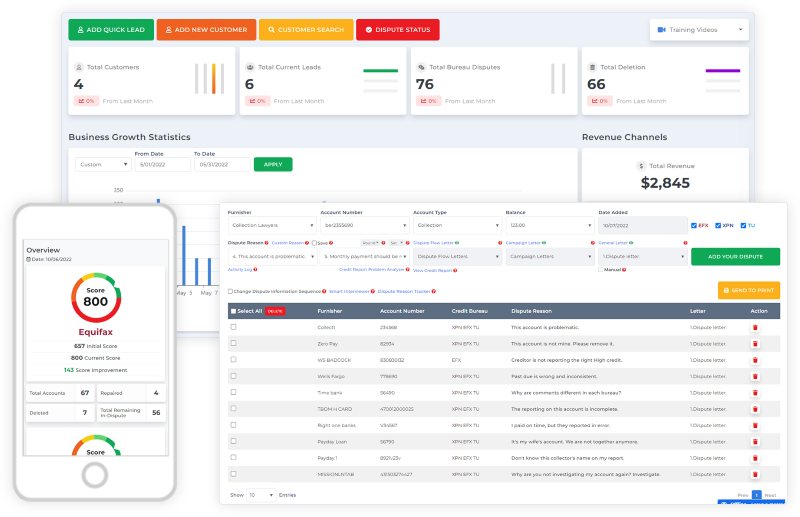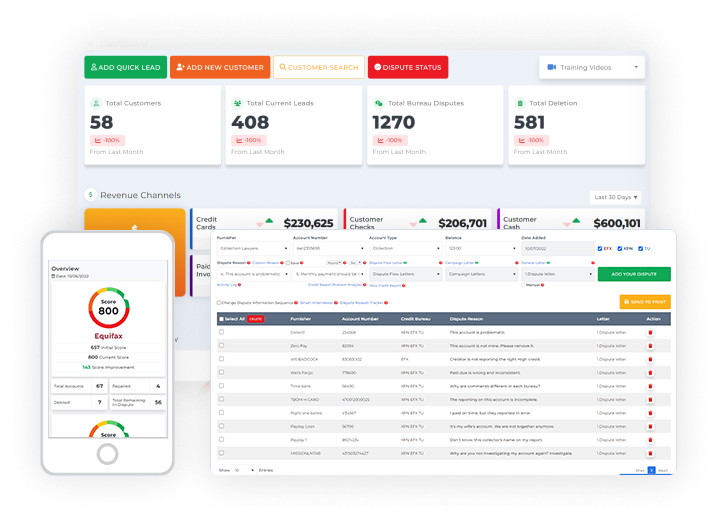Are you looking to transform your financial future through credit repair training? Whether you’re an aspiring entrepreneur or someone struggling with credit issues, understanding the ins and outs of credit repair can be a game-changer. But where do you start? How can you build a solid foundation of knowledge in credit repair? Let’s dive into a comprehensive guide that will take you from novice to expert in credit repair education.
Start Today and Explore the Features Firsthand!
Why Is Credit Repair Training Essential?
Credit repair training is crucial for anyone looking to transform their financial future or help others achieve their credit goals. Understanding the ins and outs of credit repair can be a game-changer, whether you’re an aspiring entrepreneur or someone struggling with credit issues.
Credit repair education equips you with the tools to understand credit reports, identify errors, communicate with credit bureaus, and develop strategies for improving credit profiles.
Whether you’re looking to repair your own credit or start a business helping others, a solid foundation in credit repair skills is essential. With proper credit repair training, you can navigate the complex landscape of credit and make a real difference in people’s financial lives.
Getting Started: The Basics of Credit Repair Courses
Mastering these basics lays a strong foundation for your credit repair journey. With this knowledge, you’ll be equipped to understand the complexities of credit and start making informed decisions. Remember, credit repair is a skill that improves with practice and ongoing education.
#1: Understanding Credit Reports: A Cornerstone of Credit Repair Training
The journey of credit repair education begins with a thorough understanding of credit reports. These documents are the roadmap of an individual’s credit history, and knowing how to read them is crucial.
Credit reports typically contain personal information, account histories, inquiries, and public records provided by three major credit bureaus: Equifax, Experian, and TransUnion.
Each report may contain slightly different information, so it’s important to review all three regularly. Understanding how to obtain free credit reports and interpret the information they contain is a fundamental skill taught in credit repair courses.
#2: Demystifying Credit Scores: Key Knowledge in Credit Repair Education
Credit scores are often seen as mysterious numbers that control financial destinies. However, with proper credit repair training, you can demystify these scores and learn how to influence them positively. There are several scoring models, with FICO and VantageScore being the most common.
These scores are calculated based on factors such as payment history, credit utilization, length of credit history, types of credit, and recent credit inquiries. Understanding how different financial actions impact these scores is crucial for effective credit repair. It’s also important to recognize that credit scores can change frequently and that improving them is a gradual process, as emphasized in comprehensive credit repair courses.
#3: Legal Framework: The Fair Credit Reporting Act (FCRA) in Credit Repair Training

No credit repair education is complete without a solid grasp of the legal landscape, particularly the Fair Credit Reporting Act (FCRA). This federal law governs how credit reporting agencies maintain and distribute consumer information. It provides consumers with specific rights, including the right to dispute inaccurate information and the right to free annual credit reports.
The FCRA also outlines the responsibilities of credit bureaus and information furnishers. Understanding the timelines for disputes and investigations under the FCRA is crucial for effective credit repair. Familiarity with this act not only empowers consumers but also ensures that credit repair professionals operate within legal boundaries.
Mastering these basics lays a strong foundation for your credit repair journey. With this knowledge, you’ll be equipped to understand the complexities of credit and start making informed decisions. Remember, credit repair is a skill that improves with practice and ongoing education.
Start Today and Explore the Features Firsthand!
Advancing Your Skills: Intermediate Credit Repair Techniques
As you advance in your credit repair training, you’ll find these intermediate skills invaluable. They form the core of practical credit repair work and can make a significant difference in achieving positive results. Continual practice and application of these techniques will help you become more proficient in credit repair.
Effective Dispute Strategies: Honing Your Credit Repair Skills
Mastering effective dispute strategies is a cornerstone of successful credit repair. This skill, often emphasized in credit repair courses, involves more than just identifying errors; it’s about presenting a compelling case for removal of inaccurate or unfair items. Crafting persuasive dispute letters requires attention to detail and a thorough understanding of consumer rights under the FCRA.
It’s essential to gather supporting documentation that strengthens your case. Following up on disputes is equally important, as credit bureaus and furnishers have specific timelines for responding. Understanding the nuances of different types of disputes can significantly impact the success rate of your efforts.
Negotiating with Creditors: A Crucial Credit Repair Skill
Effective negotiation with creditors is a vital skill in credit repair, often covered extensively in credit repair training programs. This process involves direct communication to achieve favorable outcomes like pay-for-delete agreements or goodwill adjustments. Understanding creditor motivations is key to successful negotiations.
It’s important to approach these conversations prepared with relevant account information and a clear proposal. Different types of agreements, such as lump-sum settlements or payment plans, may be appropriate depending on the situation.Effective negotiation with creditors is a vital skill in credit repair, often covered extensively in credit repair training programs.
This process involves direct communication to achieve favorable outcomes like pay-for-delete agreements or goodwill adjustments. Understanding creditor motivations is key to successful negotiations. It’s important to approach these conversations prepared with relevant account information and a clear proposal.
Different types of agreements, such as lump-sum settlements or payment plans, may be appropriate depending on the situation.
Credit Building Strategies: Essential Learning in Credit Repair Education

Credit repair isn’t just about removing negative items; it’s also about building positive credit. This aspect of credit repair training focuses on proactive measures to improve credit profiles. Strategies like using secured credit cards or becoming an authorized user on a well-managed account can help build credit history.
Credit-builder loans are another tool that can help establish a positive payment history. Understanding proper credit utilization and its impact on credit scores is crucial. It’s also important to educate clients on maintaining a diverse credit mix and the patience required in the credit-building process.
As you advance in your credit repair training, you’ll find these intermediate skills invaluable. They form the core of practical credit repair work and can make a significant difference in achieving positive results. Continual practice and application of these techniques will help you become more proficient in credit repair.
Becoming an Expert: Advanced Credit Repair Education
Becoming an expert in credit repair requires continuous learning and adaptation. The field is ever-evolving, with new challenges and opportunities emerging regularly. By mastering these advanced topics, you position yourself as a comprehensive credit repair professional capable of handling complex cases.
Identity Theft and Fraud Resolution: Advanced Credit Repair Training
In the digital age, identity theft and fraud have become significant concerns in credit repair. Advanced training in this area is crucial for addressing these complex issues effectively. It’s important to recognize the signs of identity theft, which can range from unfamiliar accounts on a credit report to unexpected changes in credit scores. Understanding the steps to resolve fraudulent accounts, including filing police reports and identity theft affidavits, is essential.
Implementing identity protection measures, such as credit freezes and fraud alerts, is also a key part of this advanced knowledge. Staying updated on the latest identity theft trends and protection technologies is crucial for providing comprehensive credit repair services.
Specialized Credit Situations: Expanding Your Credit Repair Skills
Advanced credit repair often involves navigating specialized situations that require in-depth knowledge. Dealing with medical collections, for instance, requires understanding the unique billing and insurance processes involved. Addressing student loan defaults involves knowledge of specific rehabilitation programs and the impact on credit reports.
Navigating the aftermath of bankruptcy requires understanding how different types of bankruptcy affect credit and the strategies for rebuilding credit post-discharge. Each of these situations demands a tailored approach and specialized knowledge to effectively improve a client’s credit standing. These skills are typically developed through extensive credit repair training and education.
Business Credit Repair: A New Frontier in Credit Repair Education
Expanding into business credit repair opens up new opportunities and challenges. Understanding the differences between personal and business credit is fundamental. Business credit reports and scores operate differently from personal ones, with distinct reporting agencies and scoring models.
Strategies for establishing and building business credit profiles often involve working with vendors and suppliers to report positive payment histories. Improving business credit scores requires knowledge of factors like business credit utilization, payment trends, and public records. Mastering business credit repair can significantly expand a credit repair professional’s service offerings and client base.
Start Today and Explore the Features Firsthand!
Overcoming Financial Anxiety: A Key Component of Credit Repair Education
Addressing the psychological aspects of credit repair is crucial for holistic financial healing. Many individuals facing credit issues experience significant anxiety and stress. Recognizing the signs of financial anxiety, such as avoidance behaviors or constant worry about finances, is the first step in addressing this issue.
Techniques for managing stress related to credit problems might include mindfulness practices or seeking professional counseling. Building confidence through knowledge and action is a key part of the credit repair process. Encouraging clients to take small, manageable steps can help alleviate anxiety and build momentum towards financial recovery.
Motivating Clients for Long-term Success: A Vital Credit Repair Skill

For those pursuing a career in credit repair, understanding how to motivate and support clients is crucial for long-term success. Effective communication techniques, including active listening and empathetic responses, are essential for building trust with clients. Setting realistic expectations is important to prevent discouragement and maintain motivation throughout the credit repair process.
Celebrating milestones and progress, no matter how small, can significantly boost client morale and commitment. Developing strategies to keep clients engaged and focused on their long-term financial goals is a key skill for credit repair professionals.
The Role of Technology in Credit Repair Training
Embracing technology in credit repair can significantly enhance efficiency and effectiveness. As the industry evolves, staying updated with the latest technological tools and trends is crucial. Remember, while technology is a powerful aid, it should complement, not replace, your expertise and personal touch in credit repair.
Credit Monitoring Tools: Essential Learning in Credit Repair Courses
In the digital age, credit monitoring tools have become indispensable in the credit repair process. These tools provide real-time updates on credit reports and scores, allowing for quick identification of changes or potential issues. Understanding how to interpret alerts and updates from these services is crucial for effective credit repair.
Many credit monitoring tools offer features like identity theft protection and credit score simulators, which can be valuable resources. Teaching clients how to use these tools effectively can empower them to take an active role in their credit repair journey. Staying informed about the latest developments in credit monitoring technology is essential for credit repair professionals.
Credit Repair Software: Enhancing Efficiency in Credit Repair Education
For professionals in the credit repair industry, familiarity with specialized software is crucial for efficient operations. Credit repair software can automate many aspects of the dispute process, from generating letters to tracking progress. Understanding the features of leading credit repair software, such as client management systems and automated follow-ups, is essential.
These tools can significantly increase productivity and ensure consistent service quality. However, it’s important to recognize that software is a tool, not a replacement for expertise. Balancing technological efficiency with personalized service is key to successful credit repair practices.
Client Dispute Manager Software: Streamlining Credit Repair Processes

As an entrepreneur in the credit repair industry, managing the debt validation process for your clients can be a time-consuming and complex task. That’s where Client Dispute Manager Software comes in. This innovative tool is designed to streamline the debt validation process, making it easier for you to generate debt verification letters, validation request letters, and debt dispute letters on behalf of your clients.
With Client Dispute Manager Software, you can:
- Automate the creation of personalized debt verification letters, validation request letters, and debt dispute letters based on your clients’ specific needs and circumstances.
- Keep track of important deadlines and follow-up dates related to the debt validation process and debt collection validation.
- Securely store and organize all documentation related to your clients’ cases, including debt verification letters, validation request letters, debt collection validation responses, and debt dispute letters.
- Access a comprehensive library of templates and resources to help you navigate the debt validation process and provide the best possible service to your clients.
By leveraging the power of Client Dispute Manager Software, you can save time, reduce errors, and improve your overall efficiency in managing the debt validation process for your clients. This powerful tool empowers you to focus on what matters most helping your clients achieve their financial goals and build a brighter future.
Start Today and Explore the Features Firsthand!
Data Security and Privacy: Critical Knowledge in Credit Repair Training
With the sensitive nature of credit information, understanding data security is paramount in credit repair. Best practices for protecting client information include using encrypted communication channels and secure storage systems. Compliance with data protection regulations, such as GDPR or CCPA, is crucial for credit repair businesses.
Educating clients on personal data security, including the importance of strong passwords and recognizing phishing attempts, is an important aspect of credit repair services. Staying updated on emerging cybersecurity threats and solutions is necessary to maintain trust and protect sensitive financial information.
Legal and Compliance Issues: Foundations of Professional Credit Repair
Understanding the legal landscape is crucial for operating a legitimate credit repair business. Compliance with the Credit Repair Organizations Act (CROA) is non-negotiable, requiring clear communication of client rights and limitations of service. State-specific regulations can vary significantly, necessitating thorough research and possibly legal consultation.
Ethical practices in credit repair, such as never guaranteeing specific results, are not just legal requirements but also build trust and credibility. Staying updated on changes in credit repair laws and regulations is an ongoing responsibility. Implementing robust compliance procedures and regular staff training can help mitigate legal risks.
Continuous Learning: The Key to Success in Credit Repair
The credit repair industry is dynamic, with frequent changes in laws, credit scoring models, and best practices. Staying updated is crucial for long-term success and credibility. Joining professional associations can provide valuable resources and networking opportunities.
Attending industry conferences and webinars offers insights into emerging trends and techniques. Following reputable credit repair resources and publications helps in staying informed about industry developments.
Engaging in ongoing education and certification programs demonstrates commitment to professionalism and expertise. Adapting business practices based on new information and industry trends is essential for maintaining a competitive edge in the credit repair market.
Conclusion
Building your credit repair training knowledge base is a journey that requires dedication, continuous learning, and practical application. Whether you’re looking to improve your own credit situation or start a thriving business helping others, the path from novice to expert is clear through comprehensive credit repair education.
Remember, every expert was once a beginner. With persistence, dedication, and the right credit repair courses and resources, you can transform yourself from a novice to an expert in credit repair. The journey may be challenging at times, but the rewards both personal and professional are well worth the effort.

Mark Clayborne
Mark Clayborne specializes in credit repair, starting and running credit repair businesses. He's passionate about helping businesses gain freedom from their 9-5 and live the life they really want. You can follow him on YouTube.
Start Today and Explore the Features Firsthand!
Below Is More Content For Your Review:


